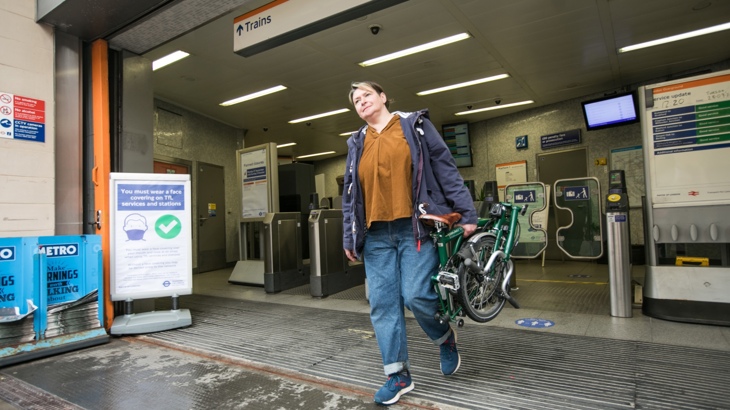James Cleeton, Sustrans' London Director, discusses the financial crisis faced by London’s transport network and what can be done to solve the funding gap.

London’s transport network is facing a financial crisis which is now significantly impeding its ability to meet its environmental, economic and social aims.
As I outlined last December, the pandemic dealt a major blow to Transport for London’s (TfL’s) finances, which have not recovered since.
Even now, when just about all Covid restrictions have been removed, the work-from-home pattern is clearly holding back demand for public transport.
Tube usage is still 30% below pre-pandemic levels, resulting in less fares income for TfL.
The shortfall between the income TfL expected in 2019 to generate from fares, and what it can now expect in future under a ‘remote revolution’ scenario of continued working from home and more online communication, could be around £1bn each year (a 10-27% reduction in fare revenue).
In response to this, we have seen a number of short-term funding deals between government and TfL.
These have covered both operating costs and spending on capital infrastructure, such as cycle tracks, low traffic neighbourhoods, and bus priority measures.
Most of us have now lost count of how many short-term (a few weeks, a few months) funding packages there have been.
The next round of negotiations is due to conclude on 24 June.
The impact of funding uncertainty
This lack of long-term funding impacts on all of TfL’s services, as well as the work of many organisations across the transport sector.
For example, we have set up community cycle hubs and a Healthy Streets Officer programme, which we know change the way people travel, but have faced uncertainty over funding.
The Healthy Streets budget – which covers London’s spending on cycle lanes, low traffic neighbourhoods and bus priority measures – has faced cuts.
Despite these cuts, we should give credit to the mayor and the Government for the ongoing commitment that has been made through these funding packages.
They have supported the continued roll-out of the kind of infrastructure London needs.
But we also need to acknowledge that this is now a funding crisis requiring big decisions, not continued short-termism.
Unless a longer-term arrangement is put in place, the so-called ‘managed decline’ scenario of large-scale cuts to public transport and no progress on walking and cycling, will set in by default.
So, what should that longer-term arrangement be?
Two clear options
There are two obvious options to solving the funding gap.
Option 1: a 10-year deal
This option proposes a 10-year funding arrangement for the Treasury to fund the expenditure required to meet the 2030 carbon reduction, Vision 0, and walking, wheeling and cycling ambitions.
It would also have to cover the urgent cost of refurbishing and rebuilding London’s ageing infrastructure.
We’ve seen a number of closures of bridges and tunnels in recent years, and their deterioration will continue without action.
This may need to be around £2bn per year up to 2030.
The advantage of such a choice is that it can be achieved within the existing constitutional arrangements.
Additionally, it only actually takes the situation back to how it was before the grant London used to received was phased out.
This grant was £3bn in 2010, for example.
The downside is that it requires taxpayers from across the UK to fund London’s transport network – something which neither Londoners nor anybody else really wants as a permanent situation if there was a viable alternative, especially with the UK’s unprecedented levels of debt.

London needs to fund its Healthy Streets programme to deliver community cycle hubs like this one in Hounslow. Credit: Paul Tanner
Option 2: further devolution
This alternative could be for London to gain more devolved revenue-raising powers, accompanied where appropriate with further devolution of service provision – local taxes for local services.
London wants to be able to pay its own way and control what it spends money on, hence why 72% of Londoners voted to set up the Mayor of London and London Assembly in 1998, and why the evidence shows that Londoners support further “fiscal devolution, irrespective of age, gender, race, location and wealth”.
Furthermore, London is already the international outlier, with Paris, Berlin, Frankfurt, Madrid, Tokyo, and New York all already having greater control over generating income than London.
But increased revenue-raising powers doesn’t necessarily translate into increased taxes.
There is nothing to prevent politicians getting elected to implement the “managed decline” scenario or come up with other solutions, if that’s what voters want.
London’s democracy is vibrant: different politicians from different political parties have won the elections and secured different mandates.
It has a vibrant media scrutiny of decisions, not only at the London-wide level but also by the national media.
London elections provide sufficient assurance of mayors and assembly members being prudent with Londoners’ money.
So what revenue-raising powers might be devolved? Here are three possibilities:
- Property taxes
The full suite of property taxes (council tax, business rates, stamp duty land tax, annual tax on enveloped dwellings and capital gains property development tax) could be fully devolved to London’s government.
The mayor and boroughs already have revenue-raising powers over some of these taxes, but more powers over not only the amounts, but also the valuations, bands and discounts, could help improve the fairness and effectiveness of some of these taxes.
For example, people on lower incomes currently pay more in council tax as a proportion of their income than people on higher incomes (according to the Trust for London), so if a mayor wanted to lower or raise council tax in an progressive way, they are currently unable to.
- Employer or income taxes
An alternative to full devolution of property taxes is to establish a ‘precept’ (directing a certain proportion of tax income) on income tax or on taxes by employers.
The second London Finance Commission recommended a proportion of income tax be hypothecated to spending in London.
Alongside this, Paris's ‘versement transport’ (transport precept) adds around 2% to the cost of employers’ national insurance contributions, for investment in public transport and maintaining low public transport fares.
- Motor taxes
The final option is for the mayor and assembly to be given further powers over raising and spending taxes on motor vehicle ownership and use.
The most talked-about of these is Vehicle Excise Duty (VED): a revenue-raising tax on the ownership of motor vehicles, the proceeds of which are all currently sent to the Treasury.
Then there are the motor taxes which the mayor already has control over (the Congestion Charge and the Ultra-Low Emissions Zone), but the objectives of these schemes are not to raise revenue.
A smarter road user charging system to replace these charges is also on the table to be implemented in the next few years.
But it too will have the objective of reducing emissions and congestion, rather than raising funds.
No need for cuts
I’ve outlined some of the options for further devolution of both revenue-raising and expenditure.
They all have positive and negative aspects, but having these options show that there is no need to make any cuts to the mayor’s transport budget.
Government and the mayor should consult on what further powers should be devolved.
Any further devolution would take time, perhaps two years, to implement.
A two-year funding settlement therefore needs to be reached whatever option above is taken forward.
2024 will then be an election in which Londoners can have more say over their future.
With this crunch deadline approaching, can we ensure it’s a two-year agreement that takes us up to a time when new powers are devolved to London?
For more news and opinion from Sustrans in London, follow us on Twitter.





